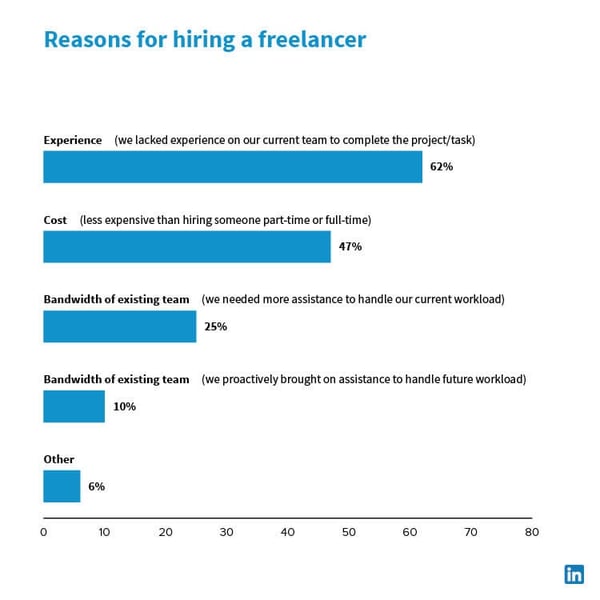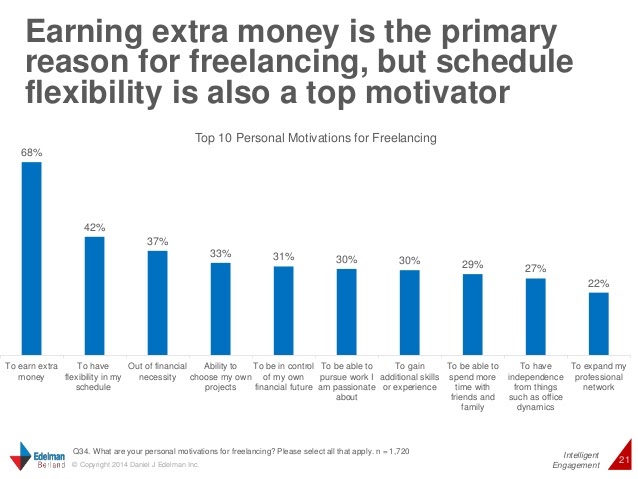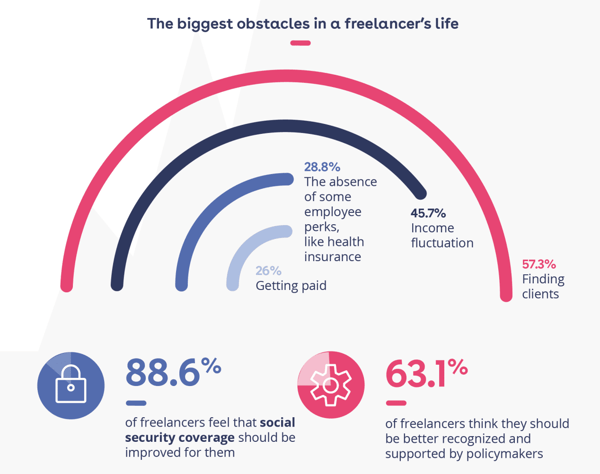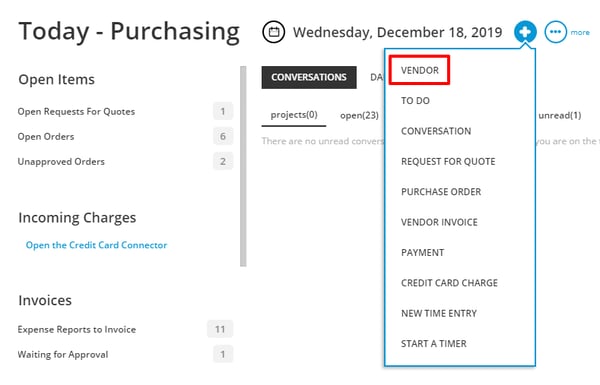Freelance talent can help your agency save costs and get more done, faster. Learn how to work effectively with freelancers in our latest post.
Flexibility, lower overhead costs, expertise - there are so many reasons to hire freelancers.
At a time when workloads and financials are uncertain, working with freelancers can be particularly attractive.
However, not all agencies are comfortable hiring freelancers. And once hired, not all agencies are good at maximizing their returns from freelance talent.
In this guide, we’ll demystify the entire process of hiring and managing freelancers. You’ll learn:
- The top three reasons for working with freelancers
- How to build lasting relationships with freelance talent
- Where to find great freelancers
Why Hire Freelancers
The last few months have revealed the fault lines in a lot of agency models.
Work has been inconsistent and there is general uncertainty about the near future.
While the prospects are certainly positive for agencies in the long run, you can be forgiven for being circumspect about hiring full-time employees at a time like this.
The result is that a lot of agencies are struggling to meet deadlines because they don’t have enough talent (or the right talent).
Hiring freelancers can bridge this gap.
From an agency’s perspective, freelancers bring three things to the table:
- Flexibility: You can hire and fire freelancers at will. There is no notice period to serve, nor do you have to spend weeks onboarding them. You can work with a freelancer for a single project and part ways when the project wraps up.
- Savings: Freelancers cost substantially less than FTEs. You don’t have to pay recruiters, nor do you have to spend money onboarding or training them. Most freelancers also have access to their own tools and work remotely, saving you money in office rent and tool purchases as well. A good freelancer can be productive from day one with little to no overhead costs.
- Expertise: Some projects require niche expertise that you might not have in-house. For such one-off cases, it makes far more sense to bring in an outside expert than to hire a full-time employee whose expertise you might not need in the future.
A LinkedIn survey of businesses revealed the same thing - experience, costs, and bandwidth are the three biggest reasons for hiring freelancers.

Additionally, hiring freelancers makes far more sense today since most agencies have already fixed the biggest point of resistance: remote work.
You might have been wary of working with someone who couldn’t share the same office as your team. But in 2020, work from home is the norm and you’re likely already used to working with a distributed team. The productivity question of hiring freelancers is largely solved.
Of course, it’s not all roses and rainbows. Working with freelancers comes with its own challenges, from cultural fit to reliability questions.
We’ll address these issues in the next section.
How to Work With Freelancers
Working with freelancers is not the same as working with full-time employees. The flexibility and low overhead costs also mean that freelancers are not loyal to your business and will have their own routines, habits, and availability issues.
You have to be willing to meet them halfway. Give them what they want - freedom, flexibility, and timely payments. At the same time, give your team enough elbow room to fit in an outside expert.
Let’s take a closer look at the key points of resistance to working with freelancers and how to overcome them.
See Things From Their Perspective
Why do people become freelancers?
While money is a strong motivation, it’s not the only one. Studies show that workers freelance for reasons ranging from flexibility and financial necessity to skill development and experience.

If you want to build successful relationships with freelancers, you have to understand these motivations. Give them what they want and they can be valuable experts you can lean on, not just guns-for-hire moonlighters.
This begs the question: What do freelancers want?
Three things, by and large:
1. Certainty
The freelance life is inherently unstable. You can’t be sure if you’ll have work next month. And even if you do, there is no guarantee that you’ll be paid on time - or paid at all.
A survey of European freelancers found that some of their biggest concerns are related to “certainty” - getting paid and finding steady work.

How you can help
Offer freelancers certainty and stability. You can do this:
- Paying invoices in full promptly
- Offering freelancers a guaranteed minimum amount of work every month
- Informing freelancers ahead of time if you’re changing your plans
I understand that being able to hire and fire freely is one of the perks of hiring freelancers. But if you want to have lasting productive relationships with them, you have to give them some semblance of certainty - almost like a semi-permanent employee.
2. Commitment
Freelancers constantly worry about clients changing plans overnight. Or not being given enough of a runway to do their best work.
You can’t be at your creative best if you think you’ll lose the gig any minute.
How you can help
For every freelancer you hire, give them some time to ramp up. Not as much as you would for a full-time employee, but enough that they can understand the campaign and the team.
Stretch things further by giving freelancers a certain number of billable hours each month - should the project permit it.
3. Respect for their time
Outside of financial motivations, flexibility is the biggest reason why people decide to freelance. Being able to set your own hours is a massive perk - one that many top freelancers won’t compromise on.
Agencies often don’t see things the same way. To them, freelance talent is just like full-time talent - they can be pinged any time with any request.
The result is usually a messy breakup.
How you can help
Understand that freelancers usually juggle several projects at the same time to make ends meet. While your project is certainly important to you, it might be lower on the freelancer’s priority list - especially if it’s a smaller project.
Fix a specific time to resolve issues and discuss the project. Don’t call them up randomly; schedule calls and chats ahead of time.
Respect their time and they’ll respect yours.
Address Your Own FUDs (Fears, Uncertainties, Doubts)
Agencies that don’t frequently work with freelancers often have deep seated reservations about the freelancer-agency relationship. They might believe that freelancers don’t fit into existing teams, or that freelance talent is somehow “inferior” to FTEs.
Before you can build strong freelance relationships, it’s important to address all these fears, uncertainties, and doubts, such as:
“The freelancer won’t integrate with the team”
This is a common concern - that freelancers won’t be a good cultural fit for the team.
By all accounts, this concern is legitimate. A freelancer working 10-20 hours/week is unlikely to even want to fit into your team’s culture.
There is no fix for this problem. You will just have to accept that freelancers will be an addendum to the team, not a part of it.
Try to get freelancers for tasks that don’t rely on teamwork. Use them as outside experts who can jump in to solve a problem, not as a cohesive part of the team.
If you’re engaging the freelancer for the long-term, consider adding them to your team-specific communication channels - at least the bits where you share non-sensitive stuff. Getting the freelancer into a group chat around the watercooler can help them feel like they’re a part of the team.
“The freelancer will take too long to be productive”
Every agency works differently. You might have your own set of tools and best practices built up over the years.
Expecting a freelancer to jump right in and be as productive as the rest of your team is unreasonable. It takes some time for even the most experienced freelancers to ramp up production.
Fix this by fixing your expectations. Give freelancers sufficient runway to get up to speed. You should also be flexible in your tools and routines. A freelancer might have his/her own best practices. Incorporate them into your workflow instead of asking them to work according to your rules and failing.
“The freelancer won’t deliver”
The belief that freelancers can’t/won’t meet your quality and time guidelines is surprisingly common.
This concern mostly stems from a lack of experience and trust. If you’ve never worked with freelancers, or don’t trust them enough, you might believe that they’ll be unable to deliver.
To fix this problem, you can:
- Hire top-quality freelancers with a proven track record (even if they’re more expensive)
- Hire for specialists instead of generalists, and match them with the right projects
- Hire from trusted platforms where past performance can be vetted
Tip: The vendor search feature in Workamajig makes it easy to find the right freelancer for the right project.

You can list freelancers as “vendors” in Workamajig and search your database for the right vendor for each project
Give Freelancers Better Briefings
Agencies frequently hire freelancers because they want outside expertise.
Because they’re hiring an “expert”, agencies often take a hands-off approach to managing freelancers. They usually have elaborate processes to onboard new hires, but when it comes to freelancers, they just assume that the “expert” would know how things work.
The truth is that while expert freelancers would know their own work, they have no idea about your team, project, or practices. If you leave them to figure it out, they’ll just fumble around wasting everyone’s time.
You can fix this by going the extra mile in your briefings. Include information such as:
- The current state of the project, key milestones, and deadlines
- Brief profiles of the team, including current management structure
- Any specific preferences - both for you and the client
- IT & security information - what tools you use, how to login, how to secure data, etc.
- Similar past projects so that freelancers know your standards and expectations better
Remember that freelancers have to mold their ways to meet your expectations. This can take time - give them ample time to get up to speed.
Treat Freelancers Like Short-Term Team Members
To get the best possible results with freelancers, you have to change how you view them.
Don’t treat them as disposable labor. If you adopt that mindset, you’re less likely to invest in cultivating relationships with them. This might be fine if you want to hire someone for a cheap one-off project. But if you want freelancers to be a core part of your talent strategy, this approach will result in disaster.
Instead, treat freelancers as valuable short-term team members. People you can lean on now and in future projects.
This minor shift in mindset changes your entire approach to the freelancer-agency relationship. You start investing in them and their success. You start trusting them more. And you help them integrate into your team.
More importantly, this approach helps you build a talent pool of trusted freelancers you can tap into again and again.
Apart from these tactics, the standard rules for hiring new employees apply to working with freelancers as well. Give them clear objectives and deadlines. Help them understand the project. And monitor their progress with regular standups.
Some additional tips to keep in mind:
- Clarify payment terms upfront. Payment disputes are a major cause of freelancer-agency strife. Both you and the freelancer should be 100% onboard whatever payment model you choose - hourly/monthly/flat fee.
- Get your paperwork right. If you’re working through a freelance platform, there might be some payment protection built in. Regardless, you should sign a contract that clearly outlines the terms of the engagement. If the project requires it, sign an NDA as well.
- Clarify the reporting hierarchy. Make sure that freelancers know the reporting hierarchy both for the project and for your agency as a whole. They should know who to get hold of in case of a problem.
- Agree on content rights. Freelancers will sometimes want to use the work they’ve done for you in their portfolios. Make sure that you agree on this upfront. You should know whether you’ll have full ownership of the IP, and if the freelancer is free to share the IP under his/her own name.
- Tell your clients. Although not always necessary, if you’re a small agency, it’s a good practice to inform clients that you have freelancers helping you. Else clients might raise complaints if they want your work displayed on a freelancer’s portfolio.
The next question is - where do you hire freelancers from?
I’ll look at some answers below.
Where to Find Freelance Talent
There’s been a Cambrian explosion in platforms that connect freelancers with agencies/businesses. The market is so massive that there are hundreds of players spread across different verticals.
Broadly, you can divide freelance platforms into three categories:
- General purpose
- Niche/industry/skill specific
- Skil matching services
You’ll want to tap into both these platform types to get the best candidates.
General Purpose Platforms
These platforms cater to all skill sets and projects regardless of their size and scope. Some of the leading players in this category include UpWork, Freelancer, PeoplePerHour, Fiverr, FreeUp, FlexJobs, and our very own, Workamajobs.
There is further stratification within these platforms. FlexJobs, for instance, has positioned itself as a more premium service, while Fiverr targets cheaper services with faster turnaround times.
Such platforms usually have a massive talent pool. While that might sound nice on paper, it means you have to vet candidates yourself.
Approach these platforms if you:
- Don’t have very specific skill requirements
- Want a skill set that isn’t covered by niche platforms
- Want a commodifiable skill (such as creating an eBook cover)
Niche-Specific Platforms
These platforms usually focus on a set of closely related skills or verticals. Here’s a short list to help you get started:
- Tech: TopTal, Lemon.io, Gigster, Gun.io, AngelList
- Design: DesignHill, Dribble, Behance, 99Designs, DesignCrowd, WorkingNotWorking
- Marketing: Credo, Contently, ClearVoice, Torchlite
Niche-specific platforms work best when you:
- Know what skill you’re looking for
- Are willing to pay a premium for vetted talent
Instead of letting just about anybody in, these platforms usually work with only proven freelancers.
On the downside, you’ll have to pay substantially more - both to the platform and to the freelancer.
If you have a project that requires top talent, niche-specific platforms should be your first priority.
Over to You
Freelancers can be an incredible force multiplier. They can bring outside expertise to your projects without adding to your overhead costs. They also give you room to grow or shrink your teams as necessary.
Effective freelance-agency relationships are built on trust and mutual understanding. You have to see things from the perspective of freelancers and address the issues they frequently deal with. At the same time, you have to address your own reservations and prejudices.
One way to make working with freelancers easier is to use a platform like Workamajig to manage your resources. Click the link below to see how Workamajig can transform your business.
